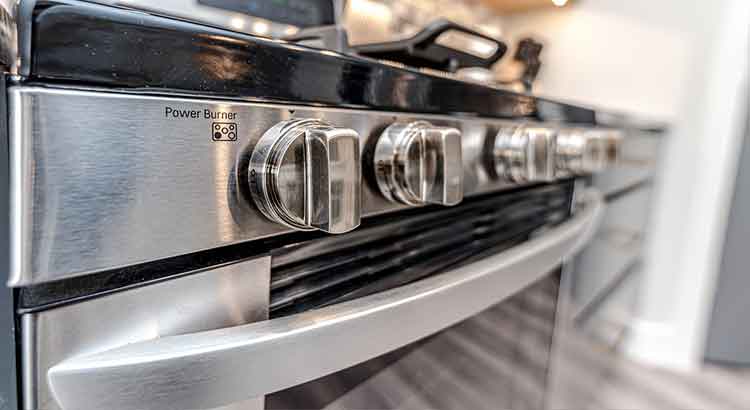Do you ever find yourself puzzled by that strange burning plastic smell coming from your oven? Is your baking experience being marred by this mysterious odor that seems to linger?
The most common reason why the oven smells like burning plastic is due to the presence of food debris or melted plastic in the oven. Accidental spills, drips, or even forgotten oven-safe materials can lead to this unpleasant scent.
Curious to know why this is happening and how you can bid farewell to that plastic stench? Dive into our simple fixes that will not only help you eliminate the odor but also ensure a delightful baking journey. From easy cleaning methods to preventive measures, we’ve got you covered. Say goodbye to the mystery of the burning plastic smell and get back to baking with confidence!
Clean the Oven
Ovens can sometimes develop odd smells, like that burning plastic scent that leaves us perplexed. To tackle this, keeping your oven clean is key. A simple wipe-down after each use can go a long way in preventing buildup and lingering odors. Food particles and grease can accumulate over time and create that unwanted plastic-like aroma.
Make it a habit to remove any food spills, splatters, or crumbs from the oven floor and walls. Use a non-abrasive cleaner and a soft cloth to gently scrub away residue. Remember to take out the oven racks and clean them separately to ensure thorough hygiene. Regular maintenance can help you bake your goodies without the interference of mystery smells.
Check for Leftover Packaging
Have you ever baked something on a plastic tray or used a plastic container to heat up food in the oven? If the answer is yes, this might be the source of the burning plastic odor. Sometimes, we inadvertently leave a piece of plastic packaging or container in the oven, and it ends up melting and emitting that unmistakable smell.
To avoid this, always double-check your oven before preheating or baking. Make sure there are no plastic utensils, packaging, or containers left inside. It’s an easy oversight that can lead to an unpleasant experience. By taking this precaution, you can wave goodbye to the mystery of the burning plastic scent and enjoy your cooking endeavors with confidence.
Burn Off Residue
Sometimes, a bit of residue from spills and splatters can get left behind in the oven, leading to that pesky burning plastic smell. To deal with this, you can try the “burn off” method. Simply preheat your oven to a high temperature (around 500°F or 260°C) and let it run empty for about an hour. This high heat can help burn off any residual food particles or grease that might be causing the odor.
Remember to open windows and ensure proper ventilation while using this method, as it can generate some smoke and fumes. Once the oven has cooled down, give it a quick wipe to remove any ash or debris that might have been left behind. This method not only helps eliminate odors but also keeps your oven interior sparkling clean.
Inspect Heating Elements
Your oven’s heating elements could be another potential source of the burning plastic smell. Over time, these elements can accumulate food debris and grease, which can then get heated and produce an unpleasant odor. Turn off the oven and allow it to cool before inspecting the heating elements.
Gently examine the heating coils or elements at the top and bottom of the oven. If you notice any visible residue, carefully clean them using a soft cloth and warm soapy water. Avoid using abrasive materials that could damage the elements. Regular maintenance of these components can prevent the buildup of odor-causing substances and ensure that your oven operates efficiently.
Check for Damaged Components
When your oven emits a burning plastic smell, it might be due to damaged components. Inspect the interior of your oven for any signs of wear and tear, such as chipped enamel or cracked surfaces. These damaged areas can trap food particles and grease, which then heat up during baking and create the unpleasant odor.
If you spot any damaged parts, consider getting them repaired or replaced. This not only helps eliminate the odor issue but also ensures the safety and efficiency of your oven. Regular maintenance and timely repairs can keep your cooking environment pleasant and odor-free, allowing you to enjoy your culinary adventures without any distractions.
Replace Seals and Gaskets
Oven seals and gaskets play a crucial role in maintaining the temperature and preventing heat from escaping. If these seals are worn out or damaged, they can let out hot air and cause the oven to overheat, resulting in that undesirable burning plastic smell. Inspect the seals and gaskets around the oven door for any visible signs of degradation.
If you notice that they are brittle, cracked, or no longer provide a tight seal, it’s time to replace them. You can find replacement seals and gaskets from appliance stores or online retailers. Properly installed and functioning seals ensure that your oven operates efficiently and prevents any unwanted odors from wafting into your kitchen.
Avoid Using Plastic Utensils
In your quest to solve the mystery of the burning plastic smell in your oven, consider the utensils you’re using. Plastic utensils, especially those that aren’t labeled as oven-safe, can release harmful fumes when exposed to high temperatures. These fumes can mix with the food you’re cooking and result in the unpleasant odor you’ve been experiencing.
Opt for utensils made from heat-resistant materials like stainless steel, silicone, or wood when baking or roasting. These materials can withstand higher temperatures without emitting any noxious fumes. If you’re unsure about the suitability of a particular utensil for oven use, it’s best to leave it out to prevent any potential odor issues.
Final Thoughts
And there you have it, a handful of simple fixes to address the perplexing issue of your oven emitting a burning plastic smell. Cooking and baking should be a joyful experience, and these straightforward solutions can help you get back to creating your favorite dishes without the interference of unwanted odors.
Remember, maintaining a clean oven, being cautious with utensil choices, and keeping an eye out for any damaged components can go a long way in preventing that mysterious scent. Regular upkeep not only ensures a pleasant cooking environment but also contributes to the longevity and efficiency of your appliance.
By implementing these tips, you’re taking a proactive approach to troubleshooting and enhancing your cooking space. Cooking and baking are more than just tasks – they’re expressions of creativity and care. With a fresh-smelling oven and a well-maintained kitchen, you’re ready to embark on countless culinary adventures. So go ahead, whip up your favorite recipes, and savor the delicious results in a space that’s free from any lingering burning plastic smell. Happy cooking!
FAQ
Q: Can leftover food spills really cause a burning plastic smell in the oven? A: Absolutely. Food particles and grease can accumulate over time and create a plastic-like odor when heated. Regular cleaning after each use can prevent this buildup and keep your oven smelling fresh.
Q: How do I burn off residue from my oven? Is it safe? A: Burning off residue involves preheating your oven to a high temperature, which can help eliminate stubborn food particles and grease. While it’s safe, remember to ventilate the area as it can produce some smoke. Afterwards, a quick wipe-down will leave your oven clean and odor-free.
Q: Can damaged oven components really cause odors? A: Yes, damaged areas like chipped enamel or cracked surfaces can trap debris, leading to unwanted smells. Regularly inspect your oven’s interior for wear and tear, and consider getting any damaged parts repaired or replaced.
Q: Are plastic utensils a major contributor to the burning smell? A: Yes, plastic utensils that aren’t labeled as oven-safe can release fumes at high temperatures, causing unwanted odors. Opt for utensils made of materials like stainless steel or silicone that can withstand heat without emitting harmful substances.
Q: How can oven seals and gaskets impact the smell in my kitchen? A: Damaged seals and gaskets can let out hot air and cause the oven to overheat, resulting in that unpleasant burning plastic odor. Regularly check these components for wear and tear, and replace them if needed to maintain an odor-free cooking environment.
Q: What if I’ve accidentally left plastic packaging in the oven? A: Accidentally leaving plastic packaging or containers in the oven can indeed lead to a burning plastic smell. Always double-check your oven before using it to ensure there’s no plastic residue inside.
Q: Is it necessary to replace damaged heating elements? A: Yes, heating elements can accumulate food debris and grease, contributing to the burning smell. Gently clean them using a soft cloth and warm soapy water to prevent odor-causing buildup.
Q: How can I prevent the burning plastic smell in the future? A: Regular cleaning, using appropriate utensils, inspecting and maintaining oven components, and being vigilant about any leftover packaging can all contribute to preventing the burning plastic smell. Taking these steps ensures a pleasant cooking experience.
Q: Can a well-maintained oven enhance my overall cooking experience? A: Absolutely! A clean and odor-free oven creates a more inviting atmosphere, allowing you to focus on your culinary creations without any distractions. Cooking becomes more enjoyable when you’re working in a fresh and pleasant environment.
Q: Are there more simple fixes I can explore to improve my cooking space? A: Certainly! The world of cooking and baking is filled with practical tips and tricks to enhance your experience. From ingredient substitutions to time-saving techniques, there’s always something new to discover and implement in your kitchen.
Q: Where can I find more helpful advice for my culinary endeavors? A: You’re not alone in your quest for culinary success. Online resources, cooking forums, and reliable cooking websites offer a wealth of information and guidance to help you become a confident and capable home chef.
Remember, your kitchen is a space for creativity and comfort. By implementing these simple fixes and remaining curious about the world of cooking, you’re well on your way to creating delicious dishes in a kitchen that’s free from any mysterious burning plastic smell. Happy cooking and baking!

